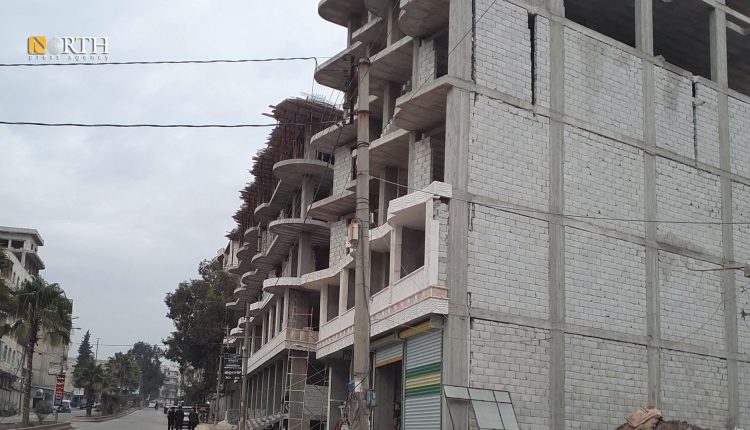
By Siwar Hamo
AFRIN, Syria (North Press) – Seven years ago, the Turkish military and affiliated Syrian armed factions justified their incursion into Afrin on security grounds, citing the need to protect Turkey’s borders. However, following their entry, systematic displacement began, alongside renaming villages and landmarks with Turkish names, replacing their original identities.
Since 2018, the Kurdish city of Afrin and the 365 surrounding villages, in northwestern Syria, has been under the occupation of Turkish state and the control of its affiliated Syrian factions.
Forced displacement and resettlement in Afrin
The displacement of Afrin’s original inhabitants started with Turkish airstrikes on the area, forcing the majority of residents to flee to the Shahba region in the northern countryside of Aleppo, as well as to Aleppo city and the Autonomous Administration areas in northeastern Syria.
Turkey’s broader strategy for Afrin became clearer over time. Thousands of Syrians displaced from Eastern Ghouta, Homs, and Hama were relocated to Afrin, which was under the control of Turkey-backed Syrian forces. This resettlement was carried out after the forced displacement of the native Kurdish population.
Beyond displacement, armed factions in Afrin have committed widespread human rights violations, including arbitrary arrests, torture, and the confiscation of civilian properties—both from those who fled and those who remained.
The demographic shift accelerated as armed groups and other individuals brought from different parts of Syria engaged in extensive urban expansion. Numerous settlements have been established by Turkish, Kuwaiti, Palestinian, and Qatari organizations, particularly in Sharran, Sheikh Hadid, Jindires, Bulbul, and Rajo near Afrin city.
Visual evidence from local sources confirms the construction of high-rise apartment buildings, fuel stations, industrial workshops, restaurants, and cafés, reshaping Afrin’s landscape while concealing a deep-seated demographic transformation.
This expansion has been facilitated by Turkish authorities, which allow the sale of land, homes, and other real estate to individuals from outside Afrin. The process is often legitimized through courts affiliated with Turkey and local factions.
Forced property sales and intimidation
Afrin’s local council, founded by Turkey, has permitted land seizures and property sales through faction-affiliated channels. Witnesses describe how these transactions often involve coercion.
Hamza Khalil, a 65-year-old resident of Afrin’s Ashrafiyeh neighborhood, recounted his experience in June 2022 when a local faction leader, Mohammed Oso from the Sham Legion, attempted to buy his second home for transforming into an apartment complex.
“When I refused, he left angrily,” Khalil said. “Within two weeks, I was detained by armed men and taken to the faction’s military headquarters. During interrogation, it was clear they wanted to intimidate me into selling.”
Following two days of physical abuse, Khalil was released, only to receive another warning: “Sell your house willingly, or we will take it by force.” Fearing for his safety and his family’s well-being, he ultimately sold the property for just $8,000—half its actual value.
According to Ali Suleiman, a 52-year-old construction contractor who resettled in Afrin, most real estate development between 2020 and 2024 has been controlled by faction leaders and their associates.
“Many of those buying and constructing buildings in Afrin are from Eastern Ghouta and Damascus,” Suleiman explained. “They sold their properties there and invested in Afrin, often partnering with Arab residents of the area to facilitate construction.”
Most of the properties being sold, Suleiman noted, originally belonged to the Arab population of Afrin—land granted to them decades ago under Syria’s former regime.
Ongoing dispossession and legal dead ends
For those who attempt to reclaim their property, legal avenues remain largely inaccessible. A 61-year-old man from the al-Ghubari family, who fled Afrin before the Turkish invasion, returned last year only to find that his land had been seized by the Eastern Army faction.
“They had divided my land, built homes, gas stations, and car washes,” he said. “The faction had even leased out portions of the land with long-term contracts.”
When he attempted to negotiate with the faction, he was told to wait until the rental agreements expired. Meanwhile, legal authorities—aligned with Turkish-backed factions—advised him to return later, as “the timing was not appropriate.”
These testimonies offer a glimpse into the ongoing transformation of Afrin, where hundreds of families from different Syrian regions now own homes, businesses, and industrial facilities—many of which were taken from their original owners.
This shift, enabled by Turkish-backed factions, has significantly altered Afrin’s demographic composition. With more than half of Afrin’s original residents now living outside Syria, many may never return, deepening the region’s demographic and political instability.
Meanwhile, factions such as the Jaysh al-Sharqiyah (Eastern Army) continue to dominate areas like Jindires. In March 2024, faction members killed four members of the Peshmarg family for celebrating the Kurdish Newroz festival—an incident emblematic of the continued ethnic and political tensions in the region.
